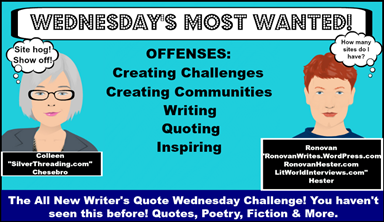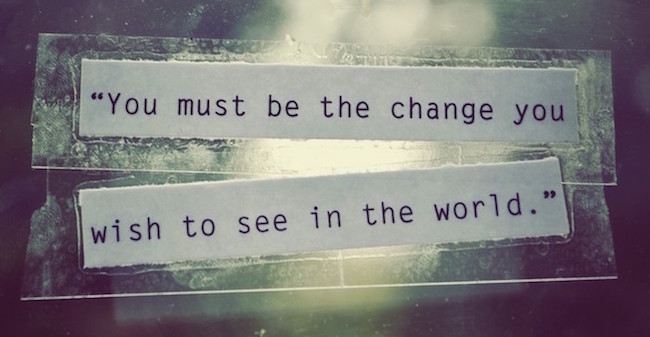by Naomi L. | May 18, 2016 | Blog, Creative Writing |
Who’s up for another round of Silver Threading and Ronovan Writes‘s Writers Quote Wednesday Writing Challenge? I know I am! With all the schoolwork taking up my time lately, it’s good to keep up on my creative inspiration now and then!

This week’s theme was change, and the quote I chose is one that’s commonly attributed to Mahatma Gandhi:

You must be the change you wish to see in the world. – Mahatma Gandhi
Like a certain “Dr. Seuss quote” I shared a while back, there is no evidence to support that this one was ever actually said by Gandhi, though many sources agree that it may have been paraphrased from a much longer quote of his about the possibility of changing ourselves to change the tendencies in the world:
We but mirror the world. All the tendencies present in the outer world are to be found in the world of our body. If we could change ourselves, the tendencies in the world would also change. As a man changes his own nature, so does the attitude of the world change towards him. This is the divine mystery supreme. A wonderful thing it is and the source of our happiness. We need not wait to see what others do. – Mahatma Gandhi
Still, I found this famous “bumper sticker quote” too uplifting to resist, so I decided to use it anyway as inspiration for a motivational poem. Enjoy!
Be The Change
If you wish to
Change the world,
Start with yourself.
If you wish to
See more peace,
Be mindful of your actions.
Avoid resorting to violence.
Know when to be patient,
And learn how to forgive.
If you wish to
See more kindness,
Be compassionate toward others.
Smile often at strangers,
And always be there
To help your friends.
If you wish to
See more tolerance,
Be open to the new.
Don’t be quick to judge.
Exercise understanding,
And treat others as your equals.
If you wish to
See more love,
Be a caring and generous soul.
Promote affection and respect,
And always do unto others as
You would have them do unto you.
If you wish to
Change the world,
To see more peace,
More kindness,
More tolerance,
More love,
Start with yourself.
You must be the change
You wish to see
In the world.
I hope you enjoyed my poem! Be sure to join the Writers Quote Wednesday Writing Challenge and share your quote-inspired works! Thanks for reading!
Writers Quote Wednesday Writing Challenge is a weekly blogging event by Colleen Chesebro of Silver Threading in collaboration with Ronovan Hester of Ronovan Writes. Be sure to check out both these authors’ blogs for your weekly dose of inspiration! Happy writing!
by Naomi L. | May 16, 2016 | Blog, Word of the Week |
Word: adumbrate
Pronunciation: A-dəm-brayt / ə-DƏM-brayt
Part of Speech: verb
Definition:
- report or represent in outline
- indicate faintly
- foreshadow or symbolize
- overshadow
Source: Oxford Dictionaries
Is it ironic to learn a word with four different meanings without seeing it used in any of them? Well, that’s how I came across today’s Word of the Week, another one picked up from the Elevate – Brain Training app. It sounds like a word I could have gotten familiar with sooner if I read more poetry, but as it happens, I’ve only ever seen it in the Spelling game. Still, with four definitions, I’d definitely take on this word as a writing challenge: to find as many ways as possible to “adumbrate” something in my stories!
To “adumbrate” something is to either represent or report it in outline, indicate it faintly, foreshadow or symbolize it, or overshadow it. The word arose in the late 16th century and comes from the Latin verb adumbrare, meaning “to shade”. This verb stems from the verb umbrare “to cast a shadow”, which in turn derives from the noun umbra “shadow”.
Though I only just learned the word “adumbrate”, I admit I already find it intriguing, not just for its multiple definitions but for how they’re all connected by the root word “shadow”: creating or perceiving a shadow of a larger picture, foreshadowing future events, or overshadowing one idea with another. While Oxford Dictionaries emphasize representation in outline as its primary definition (especially in American English), it should work equally well in any of the others. The real challenge is finding a way to work all four meanings into one written work! So if you ever find yourself needing to summarize, evidence, signify, or obscure anything in your stories, “adumbrate” is an excellent word to add to your list! Good luck!
What are your thoughts on this word? Any suggestions for future “Word of the Week” featured words?
by Naomi L. | May 13, 2016 | Flash Fiction, J.C. Wolfe's Writing |
(What If? Exercise: Read the description here.)
The archery competition was to be held in the village.
The grand prize: ten thousand coins and a kiss.
He was only here to win the latter.
He’d loved the lord’s daughter since childhood.
Secretly, she prayed for his victory.
He drew his bow steadily.
His arrow flew straight.
The maiden smiled.
True shot.
Bullseye.
This piece is based on What If? Exercise 93: “Ten to One”. The exercise is to write a 55-word story in which the first sentence has ten words, the second has nine, etc., until the last sentence has only one word. The objective is to show that precision and thrift in writing can produce surprisingly powerful results. I hope you enjoy what I’ve written. Thanks for reading!
Back to the story
by Naomi L. | May 11, 2016 | Blog, Creative Writing, What If? Writing Prompts |
I hope you’re ready for more creative inspiration! I’ve been feeling inspired by period drama lately, so today I’m sharing a few more “What If?” Writing Prompts set to the theme of history. See what historical pieces you can create from these ideas! Enjoy!
 What if… the entire European continent had developed a unified culture?
What if… the entire European continent had developed a unified culture?
What if… the Renaissance hadn’t begun in Italy?
What if… East Asian countries had never opened their doors to Western influence?
What if… the Great War (World War I) had never happened?
What if… the United States hadn’t joined World War II?
Have fun writing more twists on history!
If you have any “What If?” writing prompt suggestions (for any theme), please feel free to share them in the comments below. Ideas I like may be featured in future “What If?” posts, with full credit and a link to your blog (if you have one)! Also, if you’ve written a piece based on an idea you’ve found here, be sure to link back to the respective “What If?” post. I would love to see what you’ve done with the prompt! Thank you!
by Naomi L. | May 9, 2016 | Blog, Word of the Week |
Word: amalgamate
Pronunciation: ə-MAL-ɡə-mayt
Part of Speech: verb
Definition: combine or unite to form one organization or structure
Source: Oxford Dictionaries
Okay, perhaps I went with a more common word for this week’s vocabulary post. To be honest, I find this one particularly interesting because I’ve seen and heard various forms of it: as nouns, as a verb, and even as an adjective. It seems to be a popular choice for referring to combinations and mixtures. Why “unite” two things into one when you can “amalgamate” them instead?
To “amalgamate” two or more things is to combine them into a single structure or organization. The word arose in the early 17th century and comes from the Latin verb amalgamare “to mix”, which in turn stems from the noun amalgama, meaning “mercury alloy”. This noun derives from the Greek noun málagma, which means “emollient”.
A less common definition for the word “amalgamate” is in chemistry, where it’s usually used in the adjective form “amalgamated” to indicate a metal that has been alloyed with mercury. Note that the verb “amalgamate” stems from the noun “amalgam”, which means “a mixture or blend” or “an alloy of mercury with another metal”. I myself tend to use it most often in its noun form “amalgamation”, the action of combining or uniting. If you often join things in your stories and feel that common words like “merge” and “unite” are overused, “amalgamate” and its related forms are good words to keep on your vocabulary list!
What are your thoughts on this word? Any suggestions for future “Word of the Week” featured words?



 What if… the entire European continent had developed a unified culture?
What if… the entire European continent had developed a unified culture?
Recent Comments